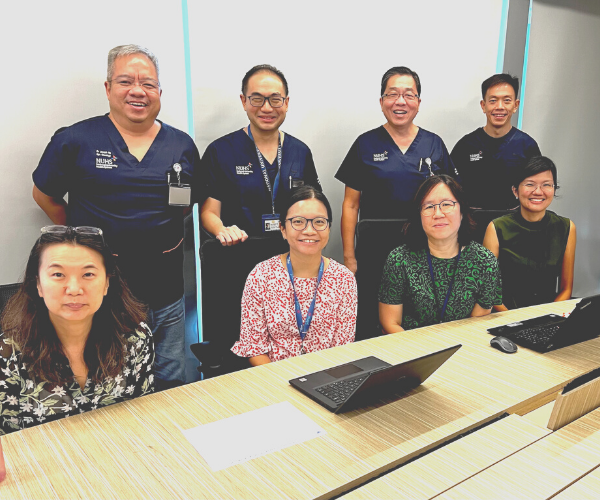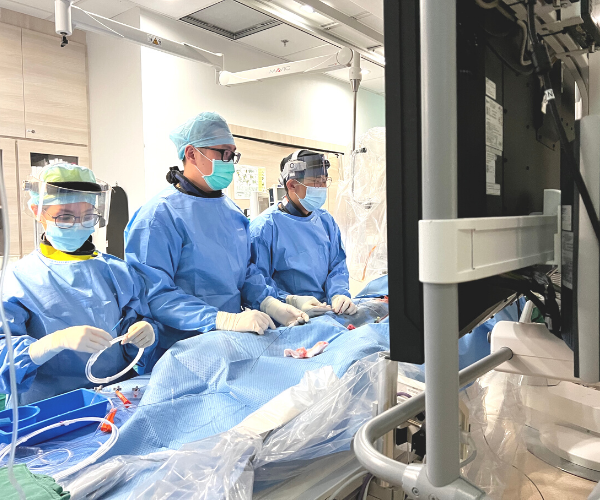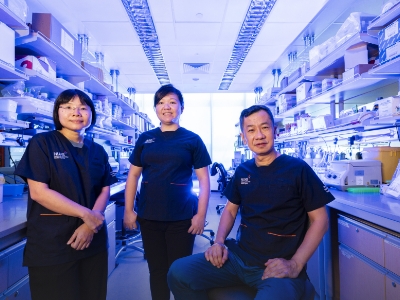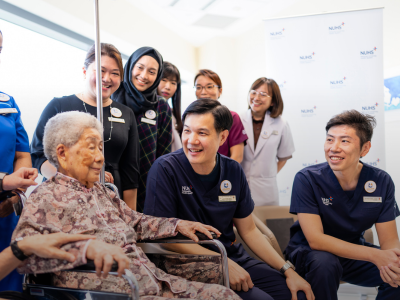Published on 18 May 2022
This International Clinical Trials Day, we spotlight three innovative trials taking place within the health system.
Necessity is the mother of invention, as the saying goes – and no more so than in the field of medicine. This International Clinical Trials day, we spotlight three innovative clinical trials, focusing on the development of better vaccines, treatment, and drugs respectively, that are taking place within the National University Health System (NUHS).
A new vaccine for yellow fever
You’re probably familiar with the Aedes aegypti mosquito, a pest infamous in the sultry tropics of Singapore as the villain behind dengue fever. But what you might not know is that it’s also the carrier of another, equally deadly disease: yellow fever.
For reasons unknown to the scientific community, yellow fever (YF) has so far remained endemic to rural Africa and South America. Far deadlier than dengue yet just as contagious, approximately 15-25% of YF-infected individuals experience multisystem disease; of these, death occurs in 20-50% of cases.
As such, vaccination is compulsory for travel to many of the countries within these regions. But existing vaccines are embryonic, which means they’re made from chicken eggs. This means that people allergic to eggs – one of the most common food allergies – don’t have this option.

In addition, while YF has so far not spread widely beyond the African and South American borders, there have been several alarming events in the past. In 2016, infected travellers from Angola arrived in China, representing the first-ever cases of YF in Asia.
There have also been other similar near-misses, in which Singaporeans returned home from Africa while carrying severe malaria, another mosquito-borne disease. Thankfully, this has not yet happened with YF.
“But if [YF] arrives in Singapore, it could spread, and it could be terrible,” Prof Tambyah explained.
Enter the new vaccine that Prof Tambyah and his team are working on. Like its older counterpart, it’s a live weakened vaccine with high levels of efficacy, safety, and immunogenicity. But unlike the older vaccine, it’s made in a laboratory instead of being cultivated in chicken eggs – which not only lowers the cost but also means that people with egg allergies won’t be excluded.
“So [this vaccine] hopefully will have fewer allergic side effects than the yellow fever vaccine currently in use here, and thus would potentially benefit more people,” he added.
The trial for the new vaccine began last year and has just completed recruitment.
A better treatment for ovarian cancer
For medical oncologist
A/Prof David Tan, ovarian cancer is a mystery that he hopes to solve.
“Ovarian cancer is one of those cancers that tend to respond very well to treatment,” he shared. “You get women coming in with big tumours that just melt away after you give them chemotherapy.
“But the fact is, these cancers keep coming back.”
This unusual pattern of behaviour spurred him to join a clinical trial headed by Dr Keiichi Fujiwara, a gynaecologic oncologist from the Saitama Medical University in Japan. The trial aimed to investigate a different (and, the team hoped, better) way of treating advanced ovarian cancer.
Here is what happens during typical cancer treatment: chemotherapy, or anti-cancer medication, is administered intravenously (IV) through a drip. The medication circulates through the patient’s bloodstream, attacking cancer cells in the body and keeping them from growing and dividing.
While this method has the benefit of being able to target cancers anywhere in the body, more recent literature suggests that it might not necessarily be the most effective one.
“So there’s a question about whether if we give the chemotherapy directly into the abdomen, if it would be more effective than the IV route in patients with advanced ovarian cancer,” explained A/Prof Tan, who is a Senior Consultant at the Department of Haematology-Oncology at the
National University Cancer Institute, Singapore (NCIS).
Known as intraperitoneal (IP) chemotherapy, this method allows the medication to directly access the tumour, which would, in theory, give way to better access and better outcomes.
Fortunately, data from A/Prof Tan’s recently-concluded trial appears to support this case. “It appears that IP chemotherapy – and particularly if your tumour is of a larger size – appears to keep the cancer under control for longer,” he said.
This means that the treatment is better able to control the spread of the disease. While this might not translate directly to better overall survival rates, it does bode well for patients’ outcomes – although more research still has to be done to see if this applies to different types of tumours.

NUH patient Mdm Tan May Ling is one patient who has benefitted from IP chemotherapy. First diagnosed with ovarian cancer in 2015, she was invited to join the trial and readily agreed.
“[A/Prof Tan] explained the benefits to me, and I thought, why not?” said Mdm Tan. “Since this method directly affects the source of the problem, it made logical sense to me, so I said OK.”
After undergoing surgery and chemotherapy, Mdm Tan’s tumour was successfully removed. While it unfortunately recurred several years later in 2020, after a laparoscopy and another few rounds of IP chemotherapy, the cancer subsided again.
Currently, Mdm Tan is in remission and returns to NUH every three months for check-ups. Despite the challenges of chemotherapy, she shared that she does not regret participating in the trial.
“[The chemotherapy] kept me free from cancer for almost five years,” she said. “I think that’s something to be thankful for.”
Inside the fight against a rare disease
As far as diseases go, pulmonary arterial hypertension is not a kind one.
Incurable and deadly, PAH is a rare blood vessel disease that more commonly affects women than men. It progresses quickly and can cause death within a year if left untreated. And while treatment options do exist, the drugs currently available on the market are expensive, costing between $3000 and $5000 monthly.
“But in a tertiary PAH referral centre as ours, it is important to advocate for this special group who might otherwise be under-treated, or unable to afford treatment.”
Currently, Asst Prof Low is investigating a drug called Macitentan. The drug works by relaxing the pulmonary blood vessels and reducing the pressure in the right chamber of the heart. But while existing guidelines set the standard dose at 10mg, “newer reports suggest that a higher dose of 75mg could be very safe, and a lot more effective,” added Asst Prof Low.
While such a high dosage could ordinarily mean exorbitant medical costs for patients, participants in the trial are provided the medication at a subsidised cost across the six years of the study duration.
And should the results reflect the drug’s efficacy, patients can not only look forward to the option of better treatment – but also improved public access to this expensive drug. “With good data…it’ll become easier for institutions to get government funding, which could push down the costs of the drug,” explained Asst Prof Low, who is also clinical director of the Women’s Heart Health Programme at NUHCS.

One patient who has benefitted from the trial is 71-year-old Mdm Cheo. Diagnosed with PAH in January 2021, Mdm Cheo initially suffered debilitating symptoms such as breathlessness and swollen legs, making daily life a struggle.
“I felt breathless even just while walking…it became unbearable,” she said in Mandarin.
After being referred to NUHCS, Mdm Cheo enrolled in the trial under Asst Prof Low’s advice, where she began receiving Macitentan as a second line of treatment.
“Now, after taking the [increased dose], I feel a lot better,” she shared. “I can walk longer distances without feeling breathless…it’s definitely not as exhausting as before.”
In consultation with Prof Paul Anantharajah Tambyah, Senior Consultant, Division of Infectious Diseases, Department of Medicine, NUH; A/Prof David Tan, Senior Consultant, Department of Haematology-Oncology, NCIS and Asst Prof Low Ting Ting, Senior Consultant, Department of Cardiology, NUHCS.







